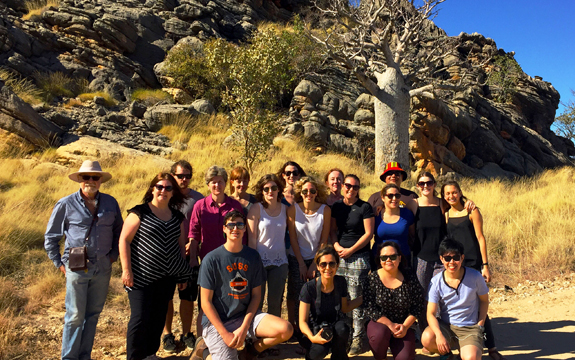Swinburne students working with Indigenous communities

In Summary
Students from Swinburne University of Technology recently travelled to the Kimberly, Western Australia, to help Aboriginal communities turn business ideas into practical business plans.
The two week study tour formed part of a project with the Marra Worra Worra Aboriginal Corporation (MWW), which represents Aboriginal communities in the Fitzroy Valley region of the Kimberley.
Tour and project leader, Swinburne’s Dr Rowan Bedggood, said the tour was a fantastic opportunity for students to learn how to engage in business practices while considering cultural sensitivities.
“Our students will gain valuable experiences through interacting with various Aboriginal communities, each with unique cultural differences. They will be challenged to infuse their business thinking in a culturally appropriate way, which in turn will not only benefit their careers but also the communities they will visit,” Dr Bedggood said.
Over the past two and a half years, Dr Bedggood and her research team have worked closely with the board, senior management and staff at MWW to develop culturally appropriate business strategies for the organisation to use.
Swinburne and the Koorie Energy Efficiency project
The study tour, along with Swinburne’s work with MWW, is one of several projects that Dr Bedggood is working on to help support Indigenous peoples. Another involves the Koorie Energy Efficiency Project (KEEP).
KEEP aims to support 4500 Aboriginal households in becoming more energy efficient.
Using a $5.5 million grant from the national Low Income Energy Efficiency Project, KEEP will roll-out 1500 Home Energy Audits and reach 3000 more households through Community Education Sessions. These sessions involve specially trained Aboriginal workers providing detailed and tailored advice to households on how to reduce their energy bills.
“The project focuses on how to encourage households to change their behaviour around energy usage, so that they achieve improvements in the quality of their life and well-being,” Dr Bedggood said.
“We are testing whether standard home visits, repeated home visits, home visits with energy display monitors, or community education sessions, bring about the greatest behavioural changes towards a reduction in energy consumption.”
Swinburne is commissioned with the task of research design, data analysis and final reporting, with the first set of results to be released in a few months. The project will be completed by June next year.
Find out about the range of study tours available to current Swinburne students.

